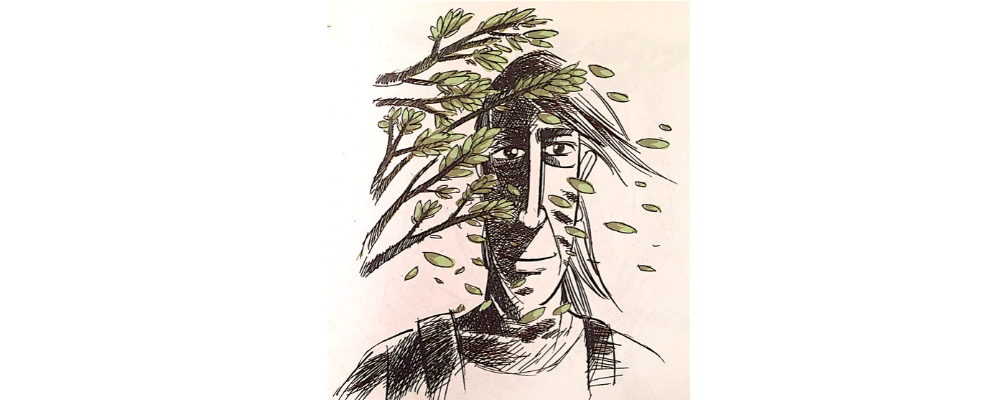Jean Giono is a writer, who had concerns about the nature especially in his early works, and produced some great works on it.
Jean Giono is a writer, who had concerns about the nature especially in his early works, and produced some great works on it. Giono states in his "Epilogue," that he does not demand copyrights from The Man Who Planted Trees, which has been translated into many languages, and that the purpose of writing it is only to "spread love of tree".
The book is a story of how an old shepherd made a barren land alive thanks to acorns and created a huge forest that would be protected under state protection years later. The story begins with the outing on the foothills of Alpine mountain to find water. The soil, where the narrator is looking for water, is so poor that even the fountain he came across is dry. After a while, he encounters an elderly shepherd, who is a silent person, who shares his water with him, who is thirsty. The narrator, who accommodates in the shepherd's shed, talks about the people who live around and depicts them as the ones having evil features inside of them. After a while he leaves the shepherd with his sheep and acorns. The narrator, who participates in the First World War, tells people that the first thing he wants to do after he is demobilized is to go back to those lands. When he went back there, his astonishment was huge. The acorns that the shepherd planted are now huge trees and everywhere is green. The shepherd continued to plant acorns without paying any attention to the battle, world, the inhumanity of the inhabitants of those old barren lands, and without any expectation of compensation. The narrator also emphasizes that what comes to life on the next visit is not just the nature or lands. At the same time, the people living in that environment are now peaceful and merry, saying that nice plants, vegetables, lime trees are accompanied by oak trees. Furthermore, the narrator tells that a nice breeze full of redolence exist now instead of the williwaw just like it is possible to hear the voice of water unlike only hearing the sound of wind in old time’s. The shepherd with its unrequited love and patience does not just revive the land, the green and the tree. At the same time, it seems that people, humanity and hopes have also grown. This can be explained by the expression of the poet: "Men resemble the same place as where he lived/He resembles the soil of that place, the water that floats in the water/to the fish swimming in that place/to the flower that pushes the earth/the smoky slope of the mountains, and the hills ..." (Cansever, Gelmiş Bulundum, 49).
Perhaps people in the desolate land, forgetting their humanity is one of the best evidences that the nature and human inner world are complementary to each other. Because, as it is seen in the story, when the inside of the human beings is barren, perhaps the outer world and its surroundings are becoming barren. However, in the shepherd's mercy, love and hope, with the help of the acorns, it has been able to infuse the soil and nature, the lands of hundreds of hectares, and the inner world of everyone living in those lands. To summarize, in a completely dry place, a shepherd built a large forest with small acorns, opening the gates of a lush and happy life again, breaking down all the boundaries of impossibility and growing the hope again.
At the beginning of the story, the narrator emphasizes the silence of the shepherd and states that he does not speak much with himself even though he is a guest. People's evil has left the shepherd alone and silence. But the shepherd's silence and all the greenery of the garden is actually a sign of hope and of love in his soul. Because human beings need love to communicate with the nature, not words. One has the power to revive the beauties of nature by sharing the beauties inside with that silence.
The Man Who Planted Trees, who does not have an upper age limit in terms of mass of readers, is important not only for the benefit of children but also adults, to reassemble the relationship with the nature, as well as questioning him/herself. The prevention of any harm to the nature is of great importance in terms of the understanding of the significance of the nature even if it is only pragmatic. While, on the last page, the writer says for the shepherd that "Elzeard Bouffier died peacefully in 1947 at the hospice in Banon," (Giono, Ağaç Diken Adam 55), he apologizes on the epilogue part for the fact that such a person never lived. As a matter of fact, it is obvious that this is not important at all. The fact that the story is valuable because it focuses on a lesson of the life, rather than the items in the story are entirely fictitious or written from a true story of the life.
Bibliography
Cansever, Edip. “Mendilimde Kan Sesleri”. Gelmiş Bulundum. İstanbul: Yapı Kredi Yayınları, 2013.
Giono, Jean. Ağaç Diken Adam. Çev. Didem Nur Güngören. İstanbul: Everest Yayınları, 2015.

